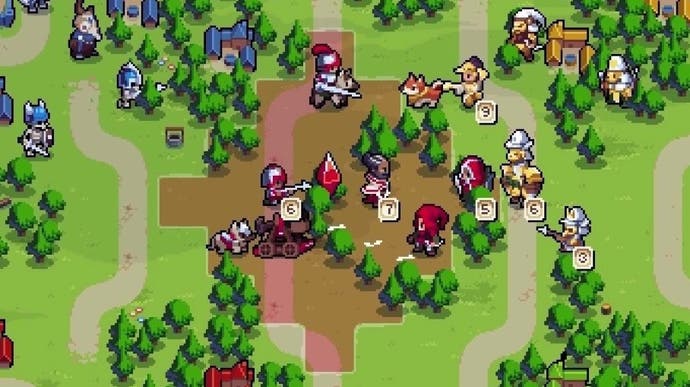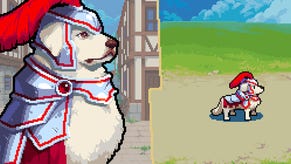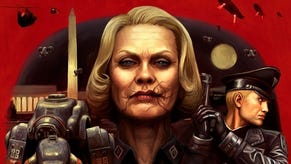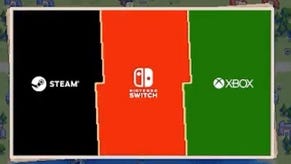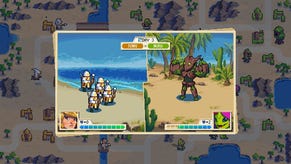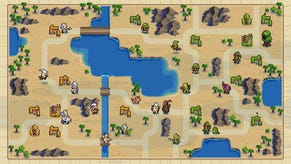WarGroove review - a forensic recreation of some all-time classics
Artificial intelligent systems.
Halfway through playing WarGroove, which is secretly a pretty odd game, a thought occurred to me which turned out, the more I considered it, to be a pretty odd thought. What if this game isn't made by Chucklefish as the title screen suggests, the thought began. What if it isn't a forensic attempt at reconstructing an Intelligent Systems turn-based tactics game? What if it actually is an Intelligent Systems game, a new one, and this whole Chucklefish smokescreen is some grand social experiment, like that psych study that pretended to be measuring the efficacy of electric shocks on memory or ESP ability or whatever, but was really exploring people's willingness to administer electric shocks to strangers in the first place?
This thought bedded in and refused to go away. What I think I was really pondering, I guess, is the fact that I had approached WarGroove knowing it was a copy of something beloved, and that sense of it being a copy may have been dulling my enjoyment somewhat. Or was it?
WarGroove is a careful reworking of games like Advance Wars and Fire Emblem. It takes the medieval fantasy of Fire Emblem, for example, but then its campaign flows more like Advance Wars, with little of Fire Emblem's cross-mission complexity. It's a very close study: the cheery tiled maps look almost identical to those of Intelligent Systems' games, while unit selection, movement, attack animations and all that jazz are very similar too. It's tempting while playing to work out which of WarGroove's units match up with which of Advance Wars' or Fire Emblems, but more importantly the action feels the same because the underlying principles are the same: capture towns to earn cash that allows you to mint new units from special buildings on the map, work out which units are strong against which other units and try to avoid overextending yourself. CO powers from Advance Wars become the titular WarGrooves here - each commander has a special ability that is charged up through play and will allow you to do something cool like heal everyone within a certain radius or pull friendly skeleton troops out of the earth to fight alongside you - and the battles unfold in a lovely corrugated manner as you press forward and then pause and then press forward again, getting the most out of different terrains like forests and mountains, pushing back fog of war on the maps that have it and, if you are really on top of things, placing units in the precise configurations that allow them to score critical hits.
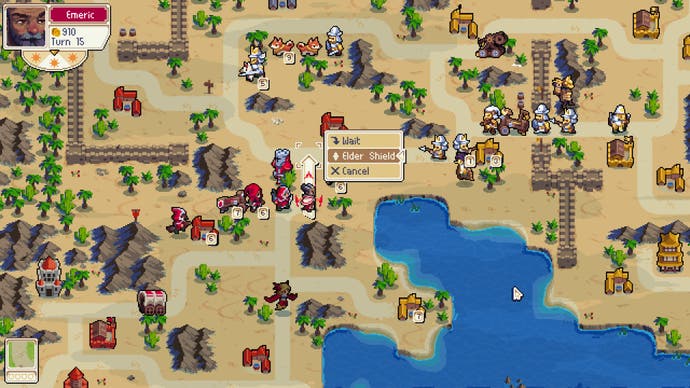
Remarkably, WarGroove does not feel like a clone in the wretched Ninja Fishing sense of the term. It's not trying to pass itself off as an original, because it requires knowledge of the original in order for you to see the appeal in the first place. It's clearly made by people who love Intelligent Systems' tactical games - who doesn't love them? - and wishes there were more of them. I suspect a bunch of people at Chucklefish simply got tired of waiting for a new Advance Wars - who isn't tired of waiting? - and decided to make it themselves.
It's not at all bad, although it is a slow starter, I think. The campaign is surprisingly spacious but tells what seems at first like a very simple story: a king has been killed and his daughter sets out for revenge. Even the beats stick closely to the likes of Advance Wars, incidentally. This is less a narrative and more a series of skirmishes against a suite of different colour-coded enemies, all of whom eventually realise that they're not your enemies at all and throw in with you.
Once you're moving along, things become pretty entertaining. WarGroove's key skill, I think, is turning simple objectives into nice little set-pieces. You're never doing much more on a map that defeating the enemy commander or destroying their HQ, or maybe pushing them back from crucial buildings or making it across the terrain to a specific target square. But there's often a lovely twist thrown in. About halfway through, I found myself in marshland and had to move between lakes to summon a ghostly king who was trying to tell me something important, all while skeletons advanced on us from every corner. In a later mission, I found myself all at sea: new units like turtles and merfolk, rushing through the waves, ducking under bridges, pushing forward still but in promising new terrain.
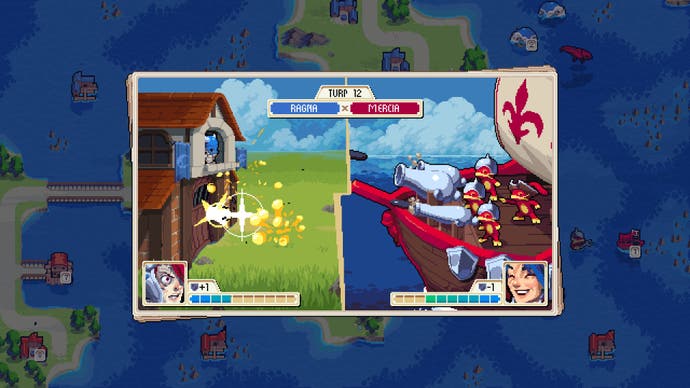
So, throughout all this fun, can I really tell this isn't an actual Intelligent Systems joint, though? I think I can. It's the big things, like the fact that, generous as the range of units are, including everything from knights on horseback to trebuchets and harpies and giants, none of them have the charisma or tactility of an Advance Wars bomber or - swoon! - medium tank. It's also the little things, like the fact - and I sound crazy for saying this, but it's surprisingly important - that the cursor doesn't have as much character as it does when Intelligent Systems is behind it. The Advance Wars cursor is a thing to play with in and of itself, each square you drag it across giving you a subtle click that makes it feel like a piece of precision machinery, locking your very intent, somehow, onto the landscape itself. The cursor in WarGroove is just a cursor - and sometimes a slightly fiddly one, too. WarGroove is very clever on the battlefield, but it isn't as interested in the feel of things as I suspect it should be. And the feel of things is surprisingly important in tactical games. I turned the battle animations off very quickly here, and I don't think I've ever turned them off in Advance Wars, because the chug and rattle of combat is just too appealing.
WarGroove's response to all this is to be gloriously generous. And man, this is a big game, with a huge campaign that builds to an unlockable epilogue mission, and is increasingly riddled with side-missions as you proceed. (Many of the side-missions are a lot of fun too.) Then there's a puzzle mode, which is basically the equivalent of those chess puzzles they publish in newspapers: win a scenario in a single turn. It's fantastic. Then there's the arcade mode that has you taking your choice of commander across a gauntlet of battles, and then there's the dizzying prospect of an editor which allows you to build your own maps - it is tremendously soothing just laying down trees and mountains and roads - and stitch them into campaigns that you can share. It's brilliantly handled, and I know that I haven't properly done it justice in the handful of maps I've made so far. Months down the line, the WarGroove community could be quite something.
There's also multiplayer, with four players supported both online and locally and a range of neat skirmish maps to investigate. WarGroove allows for cross-play, although the PS4 version isn't a certainty for this yet, and the in-game browser supports asynchronous play too, so you can make a move and go and have a pastel de nata or two (I think someone should make a rhubarb variant) and then return to give a friend an almighty shoeing. There's also ChessGroove, which is basically the set-up and objective of Chess but with WarGroove units and movements. It's nice too, and online WarGroove should have a lot of life to it hopefully.
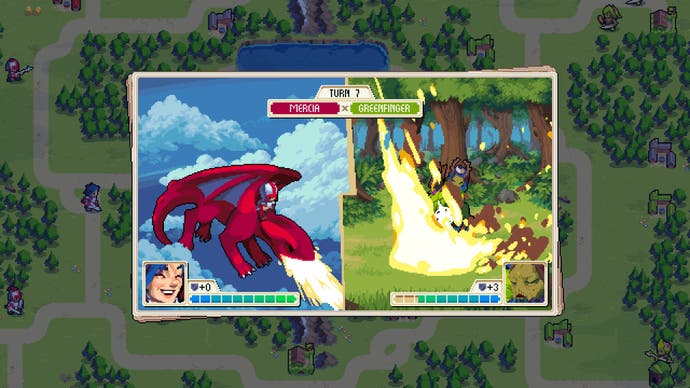
This is the kind of package that only a team fired up on enthusiasm could put together, I think, which is why I feel bad for not having had quite as much fun with WarGroove as I intended to. To be honest, more than I think of Advance Wars or Fire Emblem as I play, I find myself thinking of 17Bit's glorious Skulls of the Shogun. There's a game that was clearly driven by the same loves as WarGroove, but which reworked everything to bring its own character and imagination to proceedings. That game has a charisma of its own, and as a result when you play Skulls of the Shogun, you're only ever really thinking of Skulls of the Shogun. If Advance Wars does come to mind, in fact, it's because you notice how Skulls has actually solved some of Advance Wars' problems, limiting the number of resources you can earn from a map overall to stop the meat-grinder build up of units that occurs when both sides are entrenched, for example.
That's where I am at, really. All that skill and talent and effort and love of the subject matter, yet I wish WarGroove had invested a little more imagination in proceedings. I say this even as I understand that the point was not to give players something new, but something old and familiar and beloved.
Love is a tricky one, though. I suspect WarGroove deviates more from the Advance Wars/Fire Emblem formula than I've given it credit for. Under the hood, I imagine there are all kinds of tweaks I haven't noticed. But that's the point, isn't it? Ultimately, WarGroove isn't competing with Advance Wars and Fire Emblem so much as it's competing with my memory of them, and as any CO will tell you, that's a match-up which is never going to lead to victory. I like WarGroove but I don't love it. Generous as this game is - and it is absurdly generous - love is reserved for the real thing.
